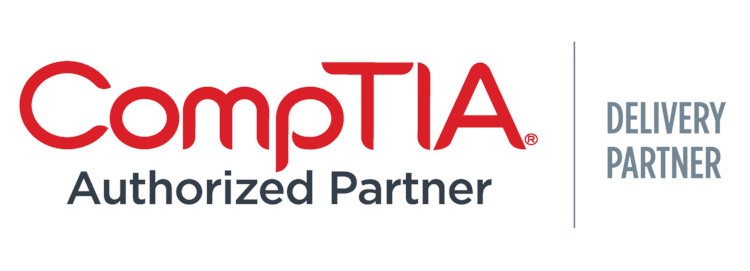- Description
- Objectives
- Outline
- Materials
- Certification
- System Requirements
- Watch a Demo
This CompTIA Linux+ course covers everyday management of server and Linux based client systems.
CompTIA Linux+
CompTIA Linux+ is a high-stakes, vendor-neutral certification that validates the fundamental knowledge and skills required of junior Linux Administrators. This course covers everyday management of Linux-based clients and basic management of server systems. Students will learn the knowledge and tools necessary to manage Linux systems from the command line, as well as how to manage user administration, file permissions, software configurations, and Linux-based clients, server systems and security. Our CompTIA Linux+ Course prepares IT professionals for the CompTIA Linux+ certification exam XK0-005.
Prerequisite(s): 12 months of hands-on experience working with Linux servers. CompTIA A+, Network+ and Server+ recommended.
CompTIA Authorized Partner ID: 1298427

** Course Subject to Change.
CompTIA Linux+
After completing this course, you should be able to:
- Identify Linux tools, software, and command-line basics
- Recall the filesystem types and how to navigate, manage and maintain Linux’s filesystem
- Recognize steps for managing users, accounts, profiles, and user groups
- Identify the basics for working with files, writing scripts, and printing
- Define the Linux shell environment
CompTIA Linux+
CompTIA Linux+ Module 1
Linux Tools
- Exploring Linux Distributions
- Locating a Terminal
- Linux Server
- Serving Local Networks
- Implementing Security and Performance
- Handling Files and Directories
- Linking Files, Directories, and Reading Files
- Processing Text Files
- Editing Text Files
CompTIA Linux+ Module 2
Configuring Your System
- Linux Boot Process
- Firmware Startup
- Linux Bootloaders
- System Recovery
- System Startup and Services
- Init
- Configuring Network Features
- Command-Line Networking Tool
- Network Troubleshooting
CompTIA Linux+ Module 3
Localization
- Comparing Graphical User Interface
- Remote Desktops
- Forwarding
- Localization Options
- Setting Your Locale
- Looking at Time
CompTIA Linux+ Module 4
Managing Your System
- Managing User Accounts
- Managing Groups
- Querying Users
- Managing Disk Space Usage
- Handling Storage
- Storage Basics
- Filesystems
- Storage Alternatives
CompTIA Linux+ Module 5
Protecting Files
- Backup Types
- Compression Methods
- Archive and Restore Utilities
- Backup Integrity
- Governing Software
- Source Code
- Packaging Applications
- Kernel Modules
CompTIA Linux+ Module 6
Securing Your System
- File and Directory Permissions
- Access Control Lists
- Context-Based Permissions
- Linux User Types
- Restricting Users and Files
- Getting to know PAM
- PKI Concepts
- Using SSH
- Using VPN as a Client
CompTIA Linux+ Module 7
Security Practices
- Importance of Logging
- Basic Logging Using rsyslog
- Providing Access Control
- Firewall Technologies
- Forwarding IP Packets
- Dynamically Setting Rules
- User Security
- Network Security
CompTIA Linux+ Module 8
Troubleshooting
- Analyzing System Properties and Remediation
- Troubleshooting the Network and Storage Issues
- Troubleshooting CPU and Memory
- Optimizing Performance
- Managing Processes
- Troubleshooting Access
- Examining File Obstacles
- Exploring Environment and Shell Issues
CompTIA Linux+ Module 9
Linux Devices
- Communicating with Linux Devices
- Working with Devices
- Using Hot-Pluggable Devices
- Storage Problems
- Uncovering Application Permission Issues
- SELinux Content Violations
- Exploring Firewall Blockages
CompTIA Linux+ Module 10
Automating Your System
- Basics of Shell Scripting
- Advanced Shell Scripting
- Writing Script Programs
- Running Scripts in Background Mode
- Running Scripts Without a Console
- Sending Signals
- Understanding Version Control
- Committing with Git
- Tags
CompTIA Linux+ Module 11
Realizing Virtual and Cloud Environments
- Considering Cloud Services
- Understanding Virtualization
- Focusing on VM Tools
- Bootstrapping
- Exploring Storage Issues
- Network Configuration
- Orchestration Concepts
- Provisioning the Data Center
Ed4Career is committed to being both environmentally conscious and making it easier for you to study! We’re making your education mobile! All of our textbooks are now provided as eTextbooks*. You can access them on your laptop, tablet, or mobile device and can study anytime, anywhere.
The move away from physical books to eTextbooks means you get the latest, most up-to-date version available. This also makes your training more accessible, so you can study anywhere you have your phone or tablet. The best part is that all materials are included in your training cost so there are NO extra fees for books!**
*A few courses still have physical materials.
CompTIA Linux+
Upon successful completion of this course, students will be prepared in part, to sit for the CompTIA XK0-005 CompTIA Linux+ certification exam.
** Certification exams are not included in the cost of the course.**
Internet Connection
- Broadband or High-Speed - DSL, Cable, and Wireless Connections
*Dial-Up internet connections will result in a diminished online experience. Classroom pages may load slowly and viewing large audio and video files may not be possible.
Hardware Requirements
- Processor - 2GHz Processor or Higher
- Memory - 1 GB RAM Minimum Recommended
PC Software Requirements
- Operating Systems - Windows 7 or higher
- Microsoft Office 2013 or higher. Also, you could use a general Word Processing application to save and open Microsoft Office formats (.doc, .docx, .xls, .xlsx, .ppt, .pptx)
- Internet Browsers - Google Chrome is highly recommended
- Cookies MUST be enabled
- Pop-ups MUST be allowed (Pop-up Blocker disabled)
- The Kindle Reader App or VitalSource Bookshelf App are needed for many of our courses (No special equipment needed. This can be downloaded for FREE onto your computer.)
- PowerPoint Viewer (if you do not have PowerPoint)
- Adobe PDF Reader
- QuickTime, Windows Media Player &/or Real Player
MAC Software Requirements
- Operating Systems - Mac OS x 10 or higher with Windows
- Mac office programs or a Word Processing application to save and open Microsoft Office formats (.doc, .docx, .xls, .xlsx, .ppt, .pptx)
- Internet Browsers- Google Chrome is highly recommended
- Cookies MUST be enabled
- Pop-ups MUST be allowed (Pop-up Blocker disabled)
- The Kindle Reader App or VitalSource Bookshelf App are needed for many of our courses (No special equipment needed. This can be downloaded for FREE onto your computer.)
- PowerPoint Viewer (if you do not have PowerPoint)
- Adobe PDF Reader
- Apple QuickTime Media Player
